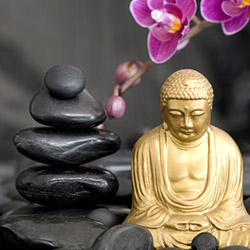Feng Shui - Chinese art of placement
 Stuck in your career? Trouble in your love life? The root of your problems may be in the design of your home, say practitioners of the ancient Chinese philosophy, feng shui. Donald Trump is using it. Virgin Airlines, the Bank of England and the United Nations have embraced it. Even the hit TV series, Big Brother, employed ideas borrowed from this ancient art. But what, exactly, is Feng Shui?
Stuck in your career? Trouble in your love life? The root of your problems may be in the design of your home, say practitioners of the ancient Chinese philosophy, feng shui. Donald Trump is using it. Virgin Airlines, the Bank of England and the United Nations have embraced it. Even the hit TV series, Big Brother, employed ideas borrowed from this ancient art. But what, exactly, is Feng Shui?
Feng Shui teaches us how to create harmony and balance around us," says Stanley Bartlett, who uses the centuries-old art to design homes and businesses. The ideas date back at least 3,000 years, yet a growing number of architects and decorators are integrating feng shui ideas with contemporary building design.
Feng shui (pronounced fung shway) is an intuitive art. Designers and decorators claim that they can "feel" positive energy - called ch'i. But architects who incorporate the Eastern philosophy are not guided by intuition alone. The ancient art prescribes lengthy and complex rules that may strike modern homeowners as quirky. For example, your home should not be built at the end of a dead-end road. Round pillars are better than square. Ceilings should be high and well-lit.
To further confuse the uninitiated, there are several different ways to practice feng shui:
- Use a compass to establish the most beneficial placement of rooms
- Draw on information from the Chinese horoscope
- Examine the surrounding land forms, streets, streams and buildings
- Use high-tech equipment to examine environmental health hazards, such as electromagnetic radiation and toxic materials
- Use some variation of a tool called the Ba-Gua - an octagonal chart outlining the most favorable placement for rooms
Yet even the most baffling practices have a basis in common sense. For example, feng shui principles warn that a kitchen door should not face the stove. The reason? A person working at the stove may instinctively want to glance back at the door. This creates a feeling of unease, which can lead to accidents.
"Everything is related to everything," says Bartlett. "If we pay attention to our environment, then we will find ways of creating different realities in our lives. When we move the bed, we also change our relationship with things around us in ways there aren't words for." Despite the numerous complicated rules, feng shui adapts to many architectural styles. Indeed, the clean, uncluttered appearance may be your only clue that a home or office building was designed according to feng shui principles.
Principles of Feng Shui
Here is How:
- Select a square or rectangular lot which is level. Water views are especially desirable.
- Place your front door so that it is easily accessible from the road. However, the pathway to your door should not form a straight line.
- Build only one front door. Never build double doors or two front entryways.
- Avoid rock gardens or obstructions near the entryway. Keep hedges trimmed back.
- Consult a ba-gua chart to select the most harmonious placement of rooms.
- Strive for high, well-lit ceilings.
- Pay special attention to the placement of doors, windows and stairways.
- Avoid long corridors and awkward or cramped floor plans.
- Consider the relationship between light, color and mood. Avoid strong overhead lighting and dark, monotone color schemes.
- Always seek clean lines and open spaces. Try to keep your new home free of clutter and debris.
Tips
- Listen closely to your instincts. What room arrangements make you feel most comfortable?
- If your architect does not embrace feng shui ideas, consider hiring a feng shui consultant to assist during the design process.
- Fill your new home with love and light. Honor it with a celebration.